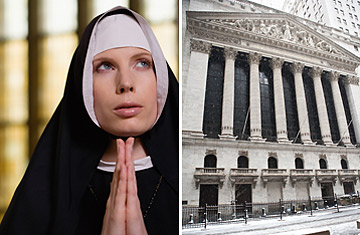
What did the nun say to the banker? Do a better job of disclosing your over-the-counter derivatives market risk. It's not a joke.
At Citigroup's annual meeting this week, a group of New Jersey nuns, the Sisters of Charity of St. Elizabeth, asked the bank's shareholders to ratify a proposal that would require Citi to issue a report by the end of the year stating its policies on the collateral used to back many of the bank's most complicated trades. And the Sisters of Charity are not alone in making requests of corporate America. The Sisters of Mercy Investment Program will ask Lockheed Martin at that company's annual meeting to detail how much money it spends developing space weapons. And environmental group As You Sow wants Coca-Cola to stop using potentially cancer-causing BPA plastics in its soda cans.
Welcome to proxy season. In the next month and a half, at corporate annual meetings across the country, shareholders will vote on hundreds of proposals put forward by religious organizations, environmental groups and institutional and individual investors. Many of the proposals have to do with governance issues like getting shareholders a say on pay and demanding that board members be independent. But in the past few years, more and more proposals being put forth by shareholders are less focused on the board and executive compensation and more focused on specific lines of business. One of the hottest topics this year is political contributions, which is getting a lot more attention in the wake of a recent Supreme Court ruling that could significantly increase corporate contributions.
"There is a rising level of support for political disclosures because a number of companies have done it already," says Robert McCormick of Glass Lewis, a firm that advises institutional investors on how to vote their proxies. "Financial firms are less of a focus this year."
Shareholder proposals are nothing new. According to Securities and Exchange Commission (SEC) rules, any shareholder of a publicly traded company that has held $2,000 worth of that corporation's stock for at least a year can send in a proposal to be voted on at the firm's annual meeting. The proposals have to be about general business practices and not day-to-day operations, which are considered to be at management's discretion. Companies include the proposals, along with management's recommendations on how shareholders should vote, on the proxy statements they send out to all shareholders once a year. Typically, most proposals that don't get management approval are voted down.
But a number of changes may make proxy proposals more contested this year than usual. Last year, the SEC ruled that brokers are no longer allowed to vote on behalf of clients who had declined or forgot to send in their proxy statements. Corporate critics claimed this was a form of ballot stuffing because brokerage firms routinely voted with management. And a number of websites like Moxy Vote have popped up that make it easier for individual investors to see shareholder proposals and vote. Lastly, in the past year, the SEC, which has final say on what proposals can be put up for vote, has been giving shareholders more leeway in what can be included in proxies.
"There has been a clear rebalancing following the financial crisis," says Laura Berry, who heads the Interfaith Center of Corporate Responsibility, an umbrella organization for 300 religious groups. "The SEC has been allowing many more things that in the past it would have said is up to the sole discretion of executives. We think that is a good thing."
Barbara Aires, a nun who is the coordinator of corporate responsibility at Sisters of Charity, based in Convent Station, N.J., says she has been concerned about derivatives and the risks they pose for banks and other financial firms for a number of years. She has proposed shareholder resolutions in the past asking Citigroup and other banks to disclose more about the transactions, which include credit-default swaps (CDSs). In past years, management has refused to include shareholder proposals about derivatives on their proxy ballets or the proposals were voted down. Citigroup, in its proxy, recommends that shareholders vote against Sisters of Charity's proposal, saying the firm has appropriate risk-control measures in place that are well documented in its annual report.
But in the wake of the collapse of insurer AIG, which lost tens of billions of dollars on CDS trades, more shareholders have grown worried about the risks of the derivative markets. Along with Citi, Goldman Sachs, JPMorgan and Bank of America all face shareholder votes to expand their disclosures around derivative transactions.
"If institutional investors had known what was going on, the banks might not have been as involved in these instruments," says Aires. "Investors need to know what are the board's risk-tolerance measures."
